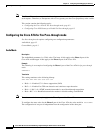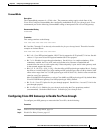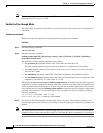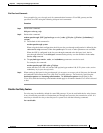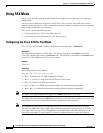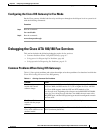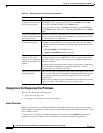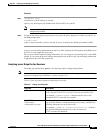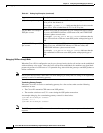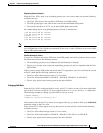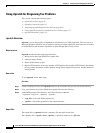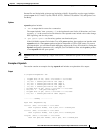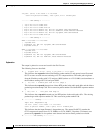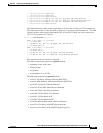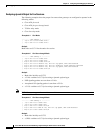
6-9
Cisco ATA 186 and Cisco ATA 188 Analog Telephone Adaptor Administrator’s Guide (SCCP)
Ol-3141-01
Chapter 6 Configuring and Debugging Fax Services
Debugging the Cisco ATA 186/188 Fax Services
Procedure
Step 1 <IP address>.<port>
<IP address> is the IP address of your PC.
<port> is any unused port (any number from 1024 to 65535) on your PC.
Note You can the Nprintf parameter on the Cisco ATA configuration web page or with the TFTP-based
configuration method.
Step 2 To operate the debug capture program prserv.exe, place the prserv program in a folder on your PC. At
the DOS prompt, enter:
C:>prserv <port>
<port> is the port number you have selected. If <port> is omitted, the default port number is 9001.
As prserv receives debug information from the Cisco ATA, it displays the information on the DOS screen
and saves it to the output file <port>.log.
Once you are finished capturing debug information, you can stop prserv by entering Ctrl-C at the DOS
prompt. If you restart the process without changing the name of the log file, any new debug information
is appended to the end of the original file.
Analyzing prserv Output for Fax Sessions
The debug log obtained from prserv is for detecting simple configuration problems.
Note A comprehensive understanding of the fax events requires the use of the rtpcatch tool (see the “Using
rtpcatch for Diagnosing Fax Problems” section on page 6-12).
Table 6-2 lists log events relevant to analyzing a fax session.
Table 6-2 Debug Log Examples
Log event Description
[ch] Enable encoder <pt> Voice encoder type pt is enabled for the channel ch, where pt can be 0
for G.711µ-law, 4 for G.723.1, 8 for G.711A-law, and 18 for G.729.
For example,
[0]Enable encoder 4 indicates that the Cisco ATA
transmitted G.723.1-encoded voice packets.
[ch] DPKT 1st:
<timestamp1>
<timestamp2>, pt <pt>
The first voice packet that the Cisco ATA received was of RTP payload
type pt for the channel ch with timestamp of timestamp1, and the local
decoding timestamp was set to timestamp2.
For example,
[0]DPKT 1st: 1491513359 1491512639, pt 4 indicates
that the first RTP packet that the Cisco ATA received was
G.723.1-encoded for channel 0.




